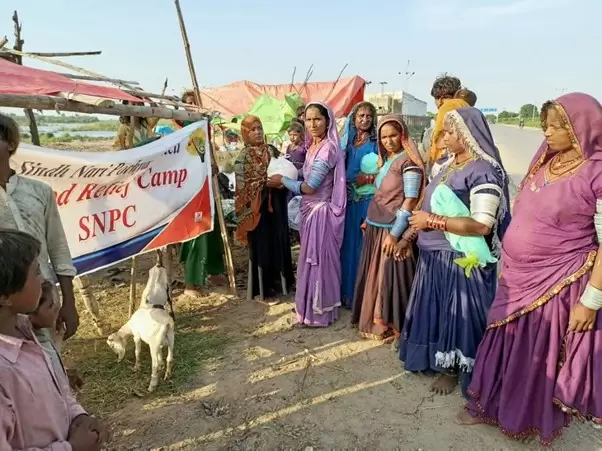Photo credit: IUF Asia/Pacific. The IUF-affiliated Sindh Women Workers Council SNPC provides support to women who lost their homes and whose fields are flooded. This reflects the collective social values and action of solidarity, compassion and caring we must restore.
The absence of social justice turns the climate crisis into a climate catastrophe
There is no doubt that we are entering an era of catastrophic climate change. Heat waves, drought, bushfires and flooding are increasing in intensity and frequency across the globe. The massive flooding across Pakistan in August severely affected 30 million people, with over 1,000 reported deaths. Government ministers and parliamentarians described the flooding as a “climate catastrophe”. Clearly, any official recognition of this flood disaster as having its origins in human-induced climate change represents significant progress after decades of denial, delay and obfuscation by governments. However, there is an important difference between recognizing that the increased intensity and frequency of extreme weather events as proof of catastrophic climate change [the climate crisis], and declaring a climate catastrophe.
Over 30 million people were affected by severe flooding and millions remain displaced or homeless because of decades of government failure to provide the necessary public services and utilities, infrastructure, housing, and social protection needed to face this crisis. It is the absence of publicly financed physical protection (protected forests and mangroves, land and soil conservation, dykes, levees, canals, public housing and affordable housing, access to potable drinking water) and the lack of of universal social protection – especially for women, informal sector workers, and migrant workers – that has allowed this flooding to become the tragedy that it is.
The exclusion, marginalization and neglect of rural communities is common in countries where governments have cut public spending on health care, water utilities, and the public infrastructure needed to support small scale and marginal farmers and fisherfolk. Within these communities there is even greater marginalization of women and indigenous/first nation peoples. Those who are systematically denied rights and marginalized experience the worst effects of extreme weather events. Already suffering from poor health due to the lack of access to adequate housing, health care, water and sanitation, and nutrition [all of which are universal human rights], the onslaught of extreme weather events is devastating. It is the absence of rights that makes this climate crisis a climate catastrophe for hundreds of millions of people around the world.
The urgent need to cut carbon emissions by the fossil fuel industry to avert catastrophic climate change was understood more than four decades ago. [The title of the memo of US President Jimmy Carter’s chief scientific advisor, Frank Press, in 1977 could not be clearer: “Release of Fossil CO2 and the Possibility of a Catastrophic Climate Change.”] But this call to cut carbon emissions and reign in the fossil fuel industry coincided with the advent of Thatcher and Reagan’s neoliberal attack on government spending and social infrastructure, public goods and services, and – most important of all – our collective social values. Replicated around the world – including by several social democratic and labour governments – neoliberalism has over the last 45 years not only undermined the capacity of governments to protect the planet and public health. It has systematically dismantled our rights to the kinds of public social infrastructure we so desperately need now. Hospitals, housing, education, electricity and water utilities were privatized as just about everything became a commodity bought and sold for profit. This includes access to potable drinking water – a fundamental human right.
The increased intensity and frequency of heat waves, wildfires, flooding, drought and other extreme weather events have renewed calls to restore our fundamental human rights and the collective social values that give meaning to those rights. Access to free public goods and services, utilities, infrastructure – publicly financed physical and social protection – is what rural and agricultural communities urgently need. This is especially so for women, children, migrants, and indigenous/first nation peoples.
This is all the more important because these very same marginalized and neglected rural and agricultural communities must feed the world. Without publicly financed physical and social protection and the support of governments, the extreme weather events driven by human-induced climate change will generate continuous food crises, leading to even greater global food insecurity.
Fundamentally this is about placing social justice at the center of our response to the climate crisis and defending planetary health. This is broadly understood as climate justice. We should recall the opening line of the final report of the WHO Commission on Social Determinants of Health in 2008: “Social justice is a matter of life and death.” Indeed, in this climate crisis, climate justice is a matter of life and death.
